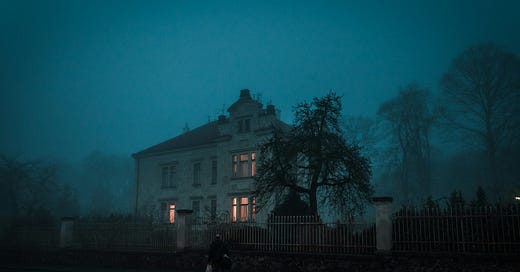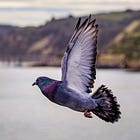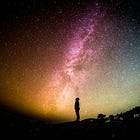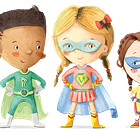Interview: Candice Zee
On magic, creating vegan representation for kids, and marketing as a self-published author
Welcome to another Wizard of Claws interview!
Candice Zee is the author of The Munchkins, an award-winning middle grade/young adult fantasy series. The Munchkins follows Capricorn Munch and her dozen ten-year-old adopted siblings. A new neighbor moves in, calling himself Big Boss, who begins tormenting the children. Oh, and the kiddos have some pretty nifty magical powers!
General Questions
Can you share a little bit about your background, including how you came to care about animals and creative writing?
I loved to write short stories even as a child, and my brother and I loved to play pretend, make up stories, and act them out. Our favorite game to play was one I created called The Munchkins, which became the premises of my book series by the same name. As I grew into adulthood, I took the idea from childhood and defined it more and more in my head until I decided I needed to write this and turn it into a book.
I’ve always had a natural empathy for animals, and at 16 I became a vegetarian and an animal rights advocate. By 19, I became vegan after visiting a farm animal sanctuary. I have done a lot of animal rights and social justice activism for most of my adult life, and have now been vegan for over 26 years.
Many of us have childhood dreams of becoming a writer. When did you decide to give it a shot?
I started writing the first Munchkins book in bits and pieces, mostly just for fun with no intention of publishing at first, around 2015 or so. There would be large gaps of time where I wouldn’t write anything, then go back to it. At some point, I decided the story was too good not to publish and that’s when I got more serious about finishing it. I banged it out within a year, and set about publishing it the next year.
Most animal advocacy focuses on creating tangible changes in the real world. What role can the arts play in changing how people think about animals?
I think the arts play a huge role in changing how people think about animals, particularly with writing and fiction. Books are a great window into the minds and points of view of other characters and people different from you, and are a great way to build empathy for others, including animals, because of it. If you read a book, or look at a piece of art, that tells a story from an animal’s perspective, or even from the perspective of a human character who cares about animals or is being unjustly treated in the same manner that many animals are treated, it’s going to likely change your view of how you see and value other animals’ lives, and that is very powerful and change-making.
What’s the hardest part of the writing process for you?
For me the hardest part of the writing process is keeping my word count to a reasonable limit and editing content out that I would really like to keep for lack of space. I actually wrote my first and second books in the The Munchkins series together originally, because I just couldn’t stop. At some point I was halfway through writing what would become the second book, looked at the word count, and realized I was over 300,000 words. That’s when I decided to break the book up into two books, and now I’m glad I did because it works a lot better as a series.
How has the writing/publishing process helped you grow as an author?
I’ve learned a lot about all the steps of the publishing process and just how much goes into it since writing my first book. I learned how extensive the editing process is, especially when working with a professional editor, as well as the cover design and interior design process. It’s definitely not something that can be done haphazardly, and you have to spend a lot of time researching and reading how to self-publish a book to make it look as professional as possible. The other thing I learned is how hard marketing is, and that you have to spend time each day promoting your book and finding ways to reach your audience and find new readers. Ask any author and they will tell you writing is the easy part compared to marketing.
Story Questions
Do you have a favorite Munchkin? (Don’t worry, I won’t tell the others!)
Yes, my favorite Munchin is definitely Allie Munch. Readers can probably tell that given how much attention is put on her in the series (lol). Allie is great because she’s got a very witty, sarcastic sense of humor (she has some of best lines in the series), she’s not afraid to stand up to the villain in the series, Big Boss, or any bully, so she’s bold and confident, but she’s also silly, playful, and very empathetic, especially with her closest siblings and with animals. She’s also extremely perceptive, and she has a strong internal sense of justice, always standing up for the powerless. My close second favorite is Breezy Munch because she’s incredibly wise, radiates compassion, she’s a natural empath, and she always stands up for what’s ethically right.
How did you create the magic system of the Munchkins universe? How did you determine what their magical abilities and limitations would be?
Hmm…that’s a good question. The magic system is basically a holdover from when I used to act it out in childhood, but their magic was pretty unlimited in what they could do and they didn’t have to wait to recharge between using powers either. I think the limitations of the system evolved as I was writing the story and realized where I wanted to take the plot as far as Big Boss goes and the conflict the Munch kids would have with him. I decided that in order for the story to work and for Big Boss to be a genuine threat, the kids couldn’t have unlimited power. Also, I think the recharging between powers and the battery analogy makes sense, because once you zap too much energy or power from yourself and deplete it, you would need time to build that energy or power back up.
I’d like to think I’d use magic for noble reasons, but in reality I’d probably be like most of the kids and use it on food so I wouldn’t have to cook so much. What would you do if you had the Munchkins’ magic?
The power the Munchkins have that I would love to have the most is their healing ability. I would love to be able to just heal myself or people and animals I care about when they are sick or injured. I would definitely make well use of that power. Admittedly, I’d also probably be like Chase and Ryan and use the powers to do chores like washing the dishes. But ultimately, I would want to be like Justin Munch and plan to use the powers to save people and animals, and find ways to use them to create a more just and equitable world for all.
As a vegan author, why was it important that the Munch family also be vegan?
I have always been passionate about animal rights and social justice advocacy, and the Munch kids as well as their adoptive father, Casey Munch, are naturally kind, empathetic, and socially conscious, so making the whole family vegan was a no-brainer for me. It was important for me to normalize veganism and give vegan kids models where they could see themselves in fiction, since this is still largely rare. Many other books with vegan themes have veganism be the whole focus of the plot or there is so much information about the treatment of animals or other vegan issues that it can veer away from the plot and come off as preachy. I wanted to make The Munchkins have a vegan message that’s more subtle, so it would mention being vegan or the family eating vegan food, or show the kids saving animals, but wasn’t in-your-face about it. This way it’s a little more subversive because you absorb the messages without realizing it, and I think that can be even more effective.
I couldn’t help but notice that Big Boss treats the kids like animals, watching them without their consent (in direct violation of it, in fact) and locking them in cages. The kids even remark on that themselves at one point. Were you intentionally drawing comparisons between them and animals, or did you only make that connection later on as the plot played out?
I love this question! I think you are the first person to have noticed that and pointed that out! Yes, there is a deliberate analogy between how the Munch children are treated and how animals are treated. This becomes even more stark and obvious in the second book, particularly by the end where if you missed the analogy, it is full-on made explicit in one dialogue scene. The analogy will become even clearer in the third book, which I’m working on now. Also, Big Boss treats animals with the same callous cruelty that he treats the Munch children. The Munch children are largely viewed and treated by people in power, like Big Boss, as things they can take from, exploit, and use for their own interests and to get what they want. The analogy between them and the exploitation of animals is unmistakable.
Being self-published, you’re not beholden to an agent, publisher, or hard deadlines. This gives you a lot more freedom but also a lot more responsibility. How did you find first readers and editors you trust, and at what point did you realize the book (The Munchkins) was ready to be published?
I knew giving the book a professional design was really important, so I went through the authors’ services site Reedsy and found great editors within my price range. I also found a professional cover designer who did the perfect job depicting the 4 main characters (Capricorn, Allie, Breezy, and Hazy) and the Munch family’s house which is largely the setting of the story. I had a few trusted people read the books pre-release, but I didn’t put a big call out for ARC readers (I think I will try to find more for the 3rd book). When everyone finished their part in the process is when I determined the book was ready for publication. I set my release date a few months in advance though in order to give time to build up its promotion and to take preorders.
The Munchkins has won several literary awards (congrats!). Can you tell us about the process of entering and winning?
I heard from book marketers that winning a literary award is one of the best ways to give your book instant validation and visibility, so I started finding different reputable literary awards I could apply to. There isn’t much to entering other than submitting your book in a category, sending them a copy of the book (either physically or electronically), and paying the application fee. Then you have to wait several months for the judges to read and review the books. I ended up applying for the first award I won, the Gold Award in the teen category of the 2021-22 Reader Views Literary Awards, because I got a raving review for The Munchkins from Reader Views, and discovered that they also had a literary awards program. I thought if the reviewers liked the book that much, I had a good chance of winning an award, so I applied. I was so surprised when I got an email from them months later that said I was a finalist, and even more surprised when they announced I won the Gold Award. After winning that award, I decided to apply for more literary awards because I figured if my book was good enough to win one award, it could win others.
How was writing a sequel different from writing the first novel?
The first book was largely upper middle-grade level, but I labeled the second book YA and recommended it for ages 12 and up only. The first book was largely more light, innocent, and dealt more with the day-to-day experience and relationships between the kids, their siblings, and their father. The second book deals with some much more mature themes, and is heavily emotional and intense. The sibling relationships still form the backbone of the story, but the second book delves into an exploration of ongoing trauma and the different ways each of the Munch kids copes with and responds to it. Therefore, the writing is heavier but there is also more suspense, drama, and lots of plot twists, so it was more fun to write.
Do you have a definitive outline for the arc of the series’ plot or more of a vague idea of how things will wrap up in each book?
I have backstory notes and ideas for scenes and plot points that I definitely want in there, but honestly the story evolves and comes together to me more as I start writing. I may have no idea how I’m going to finish a chapter or wrap up a scene until I start writing it, and then as the scene is created something will come to me that is obvious on where the scene will go, but it doesn’t become obvious until I actually start writing it.
What do you hope readers will learn from the series?
One of the major themes of The Munchkins series is family comes in all forms, you don’t have to look alike or even be blood-related to be family, and in fact that adoptive family can be more tight-knit than biological family. Another strong message is that love, compassion, and empathy are powerful forces, and that it’s important to stand up against evil and injustice in all of its forms.
Final Questions
How can readers find you and your stories online?
You can find my website (which includes character profiles for each of the Munch children and Casey) at munchkinsbooks.com. If you would like to receive the Munchkins series e-newsletter, Munchie News, you can sign up here.
The Munchkins series can be found at most online retailers, including Amazon, Barnes & Noble, and Bookshop.org. Here are the links to all the retailers where you can find the books (ebook and physical copies):
These links can also be found on my website.
You can find me on:
Any upcoming projects?
I am working on writing the 3rd book in the Munchkins series right now. Eventually I will need ARC readers, so if you are interested please contact me and let me know.
Anything else you’d like to share?
Thank you so much for this great interview opportunity!









Read this interview before. It's so fascinating 🤩 Love that there are vegan childrens books 🌱